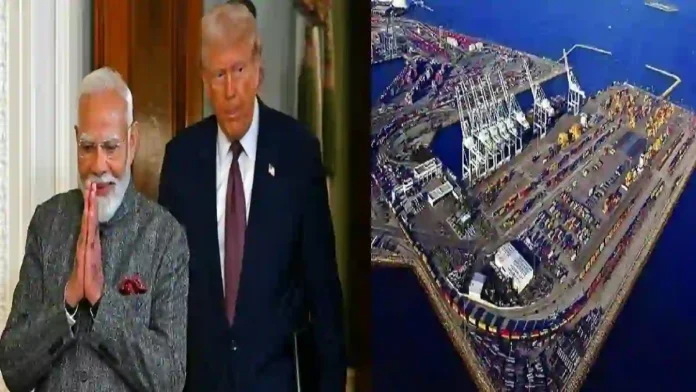The Trump Administration’s decision to revoke the 2018 sanctions waiver for Iran’s Chabahar Port marks a sharp shift in U.S. policy toward India’s key regional connectivity project.
Effective September 29, 2025, the revocation subjects all individuals, firms, and agencies linked to the port’s operation, development, rail connectivity projects, or financing to penalties under the Iran Freedom and Counter-Proliferation Act (IFCA).
Read- Will Saudi Arabia Attack India If India Strikes Pakistan Again
The waiver, granted in 2018, had created a critical carve-out that allowed India to pursue investments in the port and its associated infrastructure without triggering secondary U.S. sanctions, given the strategic importance of providing Afghanistan an alternative to Pakistan-based trade routes.
For India, the move directly affects its long-standing partnership with Iran on Chabahar, where Indian entities including Ports Global Limited have played lead roles in cargo handling and equipment supply.
The waiver had also enabled India to finance and participate in the construction of the Chabahar-Zahedan railway, key for linking Iranian ports to Afghanistan’s hinterland.
With U.S. sanctions restored, Indian companies, shipping operators, banking institutions, insurance providers, and logistics players tied to the port are at immediate risk of losing U.S. market access or facing punitive measures. This will complicate operations, deter carriers from docking, and sharply reduce Chabahar’s utility as a regional trade hub.
Strategically, the waiver’s removal threatens to disrupt India’s efforts to establish direct, secure trade links with Afghanistan and Central Asia.
Read- Forces To Form 3 Joint Military Stations To Bolster Integration
Read- Saudi, Pakistan Seal Mutual Defence Pact: Attack On One Deemed Attack on Both
Chabahar had been envisioned as a geopolitical counterweight to Pakistan’s Gwadar Port, where China has entrenched influence through the China–Pakistan Economic Corridor (CPEC). Without sanction relief, Chabahar’s development is likely to stagnate, undermining India’s vision of using the port as a strategic fulcrum for its “Connect Central Asia” policy.
This comes at a time when India has already invested significantly in port equipment, technical training of personnel, and some preliminary development works along the Chabahar corridor.
For Iran, the sanctions snap back adds to economic strain, as Tehran had relied on India’s financing and expertise to sustain port projects amidst tightening global restrictions.
Afghan stakeholders, who had benefited from Indian grain and humanitarian shipments routed through Chabahar, will also feel the impact, as aid and trade shipments face greater delays, uncertainty, and costs.
The decision effectively nullifies earlier U.S. understandings that Chabahar was essential for Afghanistan’s stability and reconstruction, raising concerns among regional stakeholders who viewed the waiver as a vital buffer to prevent Afghanistan’s overreliance on Pakistan.
The revocation also opens a geopolitical vacuum likely to be filled by China. With Indian entities deterred, Iran may court Chinese state-owned companies or deepen reliance on its existing strategic agreements with Beijing.
This dynamic risks marginalising India’s role in Iran and Central Asia while consolidating a China–Iran–Pakistan trade axis anchored around Gwadar and CPEC. Such an outcome would further limit India’s outreach to landlocked Central Asian republics, leaving New Delhi with no comparable alternate route.
In diplomatic terms, the U.S. decision is expected to complicate India–U.S. ties at a sensitive moment when both nations are cooperating closely on defence and technology.
New Delhi faces a strategic dilemma: comply with sanctions to safeguard its global financial exposure, or test U.S. resolve by sustaining its Chabahar commitments through state-backed mechanisms. The response is likely to define India’s balancing act between Washington and Tehran in the coming months.
Agencies




